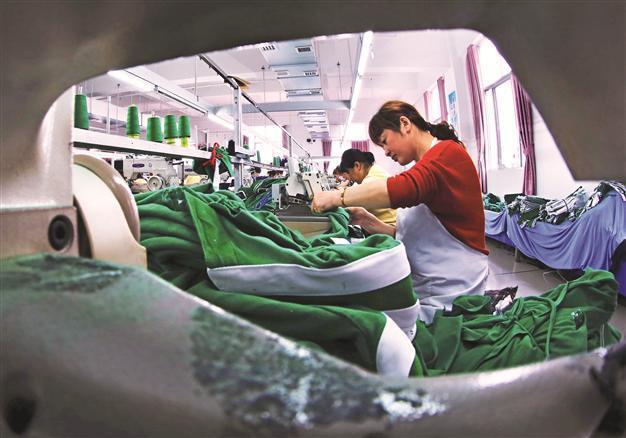Weak China output deepens worries, Europeans’ soothed
BEIJING - Reuters

Workers sew fabrics at a garment factory in China. China’s manufacturing weakened again in June amid a credit crunch and slower U.S. and European orders, two surveys showed today. AP photo
Growth in China’s vast factory sector slowed to multi-month lows in June on faltering new orders, a pair of surveys showed yesterday, boding ill for the world’s second-largest economy still smarting from fears of a credit crunch.
Meanwhile, PMI data posted yesterday for European manufacturing activity showed signs of stabilisation last month and will probably grow this quarter after encouraging signs emerged even in smaller members of the eurozone.
Economists said the two purchasing managers’ indices (PMI) reinforced their concerns that China’s economic cooldown could deepen in the second quarter, especially with Beijing looking increasingly reluctant to take action to stimulate growth.
“The Chinese economy is still struggling at the bottom,” said Haibin Zhu, chief China economist of JPMorgan in Hong Kong.
Zhu said slowing growth in China’s factory sector, as well as tighter monetary conditions in coming months after a squeeze in the interbank market in the last two weeks, could further hobble the Chinese economy this year.
The official PMI slipped to 50.1 in June from May’s 50.8, just a whisker above the 50-point level that indicates growth. The last time the reading fell below 50 was in September.
A separate PMI survey, conducted by Markit and sponsored by HSBC, fell to a 9-month low of 48.2 from May’s 49.2.
Yet, China’s leaders appear to be comfortable with the country’s slower pace of growth, with President Xi Jinping saying over the weekend that officials should no longer be lauded as “heros” if they chase economic growth at all costs.
The surveys showed demand slackening at home and abroad.
New orders in the official PMI survey tumbled to a four-month low of 50.1 in June. Unlike previous months, it did not publish a reading for new export orders this month without explaining why.
The HSBC/Markit PMI, which focuses on smaller firms and exporters, showed new orders in June slumped to their lowest level since October, even though producers had cut prices to improve sales.
The HSBC survey also showed new export orders shrinking in June at their fastest pace since September as U.S. and European clients reduced purchases even after Chinese producers passed on cost savings.
Another pair of PMI surveys measuring service activities is scheduled to be announced on Wednesday.
European signs of stabilisation For the European data, any indication of a recovery will be welcomed by the European Central Bank, which has come under pressure to take more action to help bring a quicker end to the longest recession in the bloc’s history.
Markit’s final Eurozone Purchasing Managers’ Index rose to a 16-month high of 48.8 in June from May’s 48.3, just above an earlier flash reading of 48.7 but below the break-even 50 level that divides growth from contraction for the 23rd month.
An index measuring output that feeds into the wider composite PMI due out on Wednesday jumped to 49.8, its highest level since February 2012, from 48.8.
“Eurozone manufacturing is showing welcome signs of stabilising. Both output and new orders barely fell during June, and on this trajectory a return to growth for the sector is on the cards for the third quarter,” said Chris Williamson, chief economist at Markit.
The eurozone has been in recession for a year and a half and according to a Reuters poll last month will eke out only tepid growth of 0.2 percent from this quarter.
Central bank president Mario Draghi and other ECB policymakers said last week an exit from exceptional monetary policy measures remained “distant.”
